- Home
- Dan Simmons
Phases of Gravity Page 2
Phases of Gravity Read online
Page 2
"My friend Bruce says that Scott didn't come out of his dorm room for two days after Challenger blew up," said Maggie Brown as they stood in front of the New Delhi air terminal.
"Really?" said Baedecker. "I didn't think that Scott had any interest in the space program anymore." He looked up as the rising sun suddenly was obscured by clouds. Color flowed out of the world like water from a sink.
"He said he didn't care," said Maggie. "He said that Chernobyl and Challenger were just the first signs of the end of the technological era. A few weeks later, he made arrangements to come to India. Are you hungry, Richard?"
It was not yet six-thirty in the morning but the terminal was filling with people. Others still lay sleeping on the cracked and filthy linoleum floors. Baedecker wondered if they were potential passengers or merely people seeking a roof for the night. A baby sat alone on a black vinyl chair and cried lustily. Lizards slid across the walls.
Maggie led him to a small coffee shop on the second floor where sleepy waiters stood with soiled towels over their arms. Maggie warned him not to try the bacon and then ordered an omelette, toast and jelly, and tea. Baedecker considered the idea of breakfast and then rejected it. What he really wanted was a Scotch. He ordered black coffee.
The big room was empty of other customers except for one table filled with a loud crew of Russians from an Aeroflot liner Baedecker could see out the window. They were snapping fingers to call over the tired Indian waiters. Baedecker glanced at the captain and then looked again. The big man looked familiar—although Baedecker told himself that a lot of Soviet pilots have such jowls and formidable eyebrows. Nonetheless, Baedecker wondered if he had met him during the three days he had toured Moscow and Star City with the Apollo-Soyuz Test Project crew. He shrugged. It did not matter.
"How is Scott?" he asked.
Maggie Brown looked up and a slightly guarded expression seemed to settle over her like a fine veil. "Fine. He says that he's never felt so good but I think he's lost some weight."
Baedecker had an image of his stocky son, in crew cut and T-shirt, wanting to play shortstop on the Houston Little League team but being too slow, fit only for right field. "How is his asthma? Has this humidity caused it to kick up again?"
"No, the asthma's cured," said Maggie levelly. "The Master cured it, according to Scott."
Baedecker blinked. Even in recent years, in his empty apartment, he had found himself listening for the coughs, the raspy breathing. He remembered the times he had held the boy like an infant through the night, rocking him, both of them frightened by the gurgling in his lungs. "Are you a follower of this . . . of the Master?"
Maggie laughed and the veil seemed to slip from her green eyes. "No. I wouldn't be here if I were. They don't allow them to leave the ashram for more than a few hours."
"Hmmm," said Baedecker and glanced at his watch. Ninety minutes until his flight left for Bombay.
"It'll be late," said Maggie.
"Oh?" Baedecker wasn't sure of what she was talking about.
"Your flight. It'll be late. What are you going to do until Tuesday?"
Baedecker had not thought about that. It was Thursday morning. He had planned to be in Bombay this same afternoon, see the electronics people and their earth station on Friday, take the train to Poona to visit Scott over the weekend, and fly out of Bombay for home on Monday afternoon.
"I'm not sure," he said. "Stay in Bombay a couple of extra days, I suppose. What was so important about this retreat that Scott couldn't take some time off?"
"Nothing," said Maggie Brown. She drank the last of her tea and set the cup down with an abrupt movement that held the hint of anger. "It's the same stuff as always. Lectures from the Master. Solitude sessions. Dances."
"Dances?"
"Well, not really. They play music. The beat picks up. Faster and faster. They move around. Faster and faster. Finally they collapse from exhaustion. It cleanses the soul. That's part of the tantra yoga thing."
Baedecker could hear her silences. He'd read some about this ex-philosophy professor who had become the most recent guru to young rich kids from so many well-to-do nations. According to Time, the Indian locals had been shocked at reports of group sex at his ashrams. Baedecker had been shocked when Joan told him that Scott had dropped out of graduate school in Boston to go halfway around the world. In search of what?
"You don't seem to approve," he said to Maggie Brown.
The girl shrugged. Then her eyes lit up. "Hey, I've got an idea! Why don't you spend some time sightseeing with me? I've been trying to get Scott to see something other than the Poona ashram since I got here in March. Come with me! It'll be fun. You can get an Air India in-country pass for next to nothing."
Still thinking about the group-sex rumors, Baedecker was taken aback for a moment. Then he saw the childlike eagerness in Maggie's face and chided himself for being a lecherous old man. The girl was lonely.
"Where would you be going?" he asked. He needed a second to form a polite rejection.
"I'll be leaving Delhi tomorrow," she said brightly. "I'll fly to Varanasi, then to Khajuraho, a stopover in Calcutta, then Agra and back to Poona later in the week."
"What's in Agra?"
"Only the Taj Mahal," said Maggie and leaned toward him with a mischievous look in her eyes. "You can't see India and not see the Taj Mahal. It's not allowed."
"Sorry. I'll have to," said Baedecker. "I have an appointment in Bombay tomorrow and you say Scott will be back Tuesday. I need to fly home no later than a week from Friday. I'm stretching this trip out as it is." He could see the disappointment even as she nodded.
"Besides," he said, "I'm not much of a tourist."
The American flag had looked absurd to Baedecker. He had expected to be stirred by it. Once in Djakarta, after being away from the States for only nine months, he had been moved to tears by the sight of the American flag flying from the stern of an old freighter in the harbor. But on the moon—a quarter million miles from home—he could think only of how silly the flag looked with its wire extended stiffly to simulate a breeze in the hard vacuum.
He and Dave had saluted. They stood downsun of the television camera they had erected and saluted. Unconsciously, they had already fallen into the habit of leaning forward in the low-gee "tired ape" position Aldrin had warned them about in briefings. It was comfortable and felt natural, but it photographed poorly.
They had finished the salute and were ready to lope off to other things, when President Nixon talked to them. For Baedecker it had been Nixon's patched-in, impromptu phone call that had pushed an unreal experience into the realm of the surreal. The president obviously had not planned what he would say during his call, and the monologue wandered. Several times it seemed that he had ended his sentence and they would begin to reply only to have Nixon's voice come in again. The transmission lag added to the problem. Dave did most of the talking. Baedecker said, "Thank you, Mr. President," several times. For some reason Nixon thought that they would want to know the football scores from the previous day's games. Baedecker loathed football. He wondered if this prattle about football was Nixon's idea of how men talked to men.
"Thank you, Mr. President," Baedecker had said. And all the time he stood there in the camera's eye, facing a frozen flag against a black sky and listening to the static-lashed maunderings of his nation's chief executive, Baedecker was thinking about the unauthorized object he had hidden in the contingency sample pocket above his right knee.
The Delhi-Bombay flight was three hours late getting off. A British helicopter salesman sitting next to Baedecker in the terminal said that the Air India pilot and flight engineer had been having a feud for weeks now. One or the other would hold up the flight every day.
Once airborne, Baedecker tried to doze, but the incessant chiming of call-buttons kept him awake. They had no sooner taken off than every other person on the aircraft seemed to be ringing for the saried stewardesses. The three men in the row ahead of Baedecker were loudly
demanding pillows, demanding drinks, and snapping their fingers in an imperious manner that went against his Midwestern, egalitarian grain.
Maggie Brown had left him shortly after breakfast. She had scribbled her "Grand Tour Itinerary" on a napkin and stuffed it into the coat pocket of his suit. "You never know," she said. "Something might happen to change your mind." Baedecker had asked a few more questions about Scott before she drove off in a black-and-yellow cab, but his overall impression was of a girl who had mistakenly followed her lover to a strange and alien land and who no longer knew how he felt or thought.
They were flying in a French Air Bus. Baedecker noticed with a professional eye how the wings flexed with greater latitude than a Boeing product and noted with some surprise the steep angle of attack the Indian pilot chose. American airlines would not allow their pilots to horse the machine around like that for fear of alarming their passengers. The Indian passengers did not seem to notice. Their descent toward Bombay was so rapid that it reminded Baedecker of a ride he had hopped into Pleiku in a C-130 where the pilot had been forced to drop in almost vertically during the final approach for fear of small-arms fire.
Bombay seemed composed totally of shacks with tin roofs and factories rotting with age. Then Baedecker caught a glimpse of high-rise buildings and the Arabian Sea, the plane banked at a fifty-degree angle, a plateau rose to greet them out of the shacks, and they were down. Baedecker nodded a silent compliment to the pilot.
The cab ride from the airport to his hotel was almost too much for Baedecker's exhausted senses. Immediately beyond the gates of Bombay's Santa Cruz Airport the slums began. Dozens of square miles of tin-roofed shacks, sagging canvas lean-tos, and narrow, muddy lanes stretched on either side of the highway. At one point a twenty-foot-high water pipeline cut through the tangle of hovels like a garden hose through an anthill. Brown-skinned children ran along the top or reclined on its rusty sides. Everywhere there was the dizzying movement of uncountable bodies.
It was very hot. The humid air pouring in the open windows of the taxi hit Baedecker like a steam-heated exhaust. Occasionally he caught glimpses of the Arabian Sea to his right. A huge billboard in the suburbs proclaimed 0 DAYS TO THE MOONSOON but there was no cooling rain from the low ceiling of clouds, only a reflection of the terrible heat and an ominous sense of weight that settled on his shoulders like a yoke.
The city itself was even more dizzying. Every side street became a tributary of white-shirted humanity pouring into ever-larger streams and rivers of population gone insane. Thousands of tiny storefronts offered their brightly colored wares to the millions of thronging pedestrians. The cacophony of car horns, motors, and bicycle bells wrapped Baedecker in a thick blanket of isolation. Gigantic, lurid billboards touted movies starring actors with pink cheeks and actresses with raven hair, bee-stung lips, and a purplish cast to their complexions.
Then they were on Marine Drive, the Queen's Necklace, and the sea was a pounding, gray presence to their right. To his left, Baedecker caught glimpses of cricket fields, open-air crematoriums, temples, and high-rise office buildings. He thought that he could see a thin cloud of vultures circling above the Tower of Silence, waiting for the bodies of the Parsee faithful, but when he looked away, the specks continued to circle in the periphery of his vision.
The blast of air-conditioning inside the Oberoi Sheraton made his sodden skin tremble. Baedecker hardly remembered registering or following the red-coated porter to his room on the thirtieth floor. The carpets smelled of some sort of carbolic, antiseptic cleanser, a group of loud Arabs in the elevator reeked of musk, and for a second Baedecker thought that he was going to be sick. Then he was slipping a five-rupee note to the porter, the drapes were drawn across the wide window, the door was closed, sounds were muffled, and Baedecker tossed his seersucker coat on a chair and collapsed on the bed. He was asleep in ten seconds.
They had taken the Rover almost three miles, a record. It was a bumpy ride. The powdered moondust flew out from each wheel in an odd, flat trajectory that fascinated Baedecker. The world was bright and empty. Their shadow leaped ahead of them. Beyond the crackle of the radio and the internal suit sounds, Baedecker sensed a silence cold and absolute.
The experiment site was well removed from the landing area in a flat spot near a small impact crater designated Kate on their maps. They had been moving uphill gradually with the tiny computer in the Rover memorizing each turn and twist. The landing module was a glitter of gold and silver in the valley behind them.
Baedecker deployed the bulky seismic package while Dave took time to make a full panoramic sweep with his chest-mounted Hasselblad. Baedecker took care in running out the ten-meter gold wires. He watched Dave pivot lightly after each shot, a humanoid balloon tethered to a bright beach. Dave called something to Houston and bounced south to photograph a large rock outcropping. The earth was a small blue-and-white shield in a black sky.
Now, thought Baedecker. He dropped to one knee, found that too difficult in the pressure suit, and went to both knees in the dust to secure the end of the last seismic filament. Dave continued to move away. Baedecker quickly unzipped the sample pocket above his right knee and removed the two objects. His thick gloves fumbled over opening the plastic bag, but he succeeded in shaking the contents into his dusty palm. The small, colored photograph he propped against a small rock about a meter from the end of the sensor filament. It was half in shadow and Dave would not notice it unless he was standing right above it. The other object—the Saint Christopher's medal—he held loosely for a moment, irresolute. Then he bent slightly, touched the metal to the gray soil, dropped it in the bag, and quickly returned it to the sample pocket before Dave returned. Baedecker felt odd kneeling there on the lunar soil, supplicant, his bulking shadow thrown in front of him like a black cloth. The little three-by-five photograph looked back at him. Joan was wearing a red blouse and blue slacks. Her head was turned slightly toward Baedecker, who was smiling directly at the camera. Each had a hand on Scott's shoulders. The seven-year-old was grinning widely. He was wearing a white dress shirt for the photograph, but at the open neck Baedecker could see the blue Kennedy Space Center T-shirt, which the boy had worn almost every day of the previous summer.
Baedecker glanced left at the distant figure of Dave and had started to rise when he sensed a presence behind him. His skin went clammy in his suit. He rose and turned slowly.
The Rover was parked five meters behind him. The television camera, controlled from a console in Houston, was mounted on a strut near the right front wheel. The camera was pointing directly at him. It tilted back slightly to track him as he rose to his full height.
Baedecker stared across the glare and the distance at the small, cabled box. The black circle of the lens stared back at him through silence.
The wide antenna cut a sharp parabola from the monsoon sky.
"Impressive, is it not?" asked Sirsikar. Baedecker nodded and looked down from the hill. Small patches of farmland, none larger than two acres, ran along the narrow road. The homes were untidy piles of thatch atop rough poles. All along the way from Bombay to the receiving station, Sirsikar and Shah had pointed out places of interest.
"Very nice farmhouse," Shah had said, gesturing toward a stone building smaller than the garage in Baedecker's old home in Houston. "It has a methane converter, don't you know."
Baedecker was noticing the men standing on their flat, wooden plows behind their tired-looking oxen. Prongs pushed through the cracked soil. One man had his two sons standing with him so the wooden wedges would dig more deeply into the dry earth.
"We have three now," continued Sirsikar. "Only the Nataraja is synchronous. Both the Sarasvati and Lakshmi are above the horizon for thirty of their ninety-minute transit time and the Bombay station here handles real-time transmissions from them."
Baedecker glanced at the little scientist. "You name the satellites after gods?" he asked.
Shah shuffled uncomfortably but Sirsikar beamed at Baedecker. "O
f course!"
Recruited while Mercury flew, trained during Gemini, blooded in Apollo, Baedecker turned his eyes back to the steel symmetry of the huge antenna.
"So did we," he said.
DAD. WILL BE ON RETREAT UNTIL SAT JUNE 27. BACK POONA SUN. IF YOU RE THERE, SEE YOU THEN. SCOTT.
Baedecker reread the cable, crumpled it, and shot it at the wastebasket in the corner of his room. He walked to the broad window and stared down at the reflection of lights from the Queen's Necklace on the choppy waters of the bay. After a while he turned and went down to the desk to write out a cable to St. Louis, informing his firm that he would be taking his vacation now after all.
"I knew you'd come," said Maggie Brown. They stepped ashore from the tourist boat and Baedecker recoiled slightly from the onslaught of beggars and peddlers. He wondered again if he had made a mistake by not accepting the credit card commercial. The money would have been welcome.
"Did you guess that Scott would stay at the retreat?" asked Baedecker.
"No. I'm not surprised, but that's not it. I just had a hunch I'd see you again."
They stood on the bank of the Ganges and shared another sunrise. Already crowds were filling the oversized steps that led down into the river. Women rose from the coffee-colored water, wet cotton clinging to their thin forms. Earth-brown pots echoed the color of skin. Swastikas adorned a marble-fronted temple. Baedecker could hear the slap, slap, slap of the washer-caste women beating laundry against the flat rocks upstream. The smoke from incense and funeral pyre floated and mingled in the wet morning air.
"The signs say Benares," said Baedecker as they fell in with the small group. "The ticket was to Varanasi. Which is it?"

 The Terror
The Terror Endymion
Endymion Hyperion
Hyperion The Crook Factory
The Crook Factory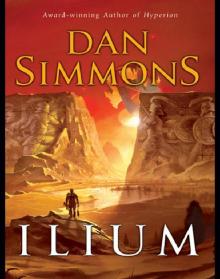 Ilium
Ilium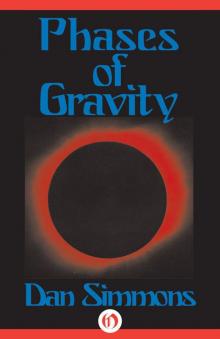 Phases of Gravity
Phases of Gravity Hardcase
Hardcase Fires of Eden
Fires of Eden Children of the Night
Children of the Night Muse of Fire
Muse of Fire Drood
Drood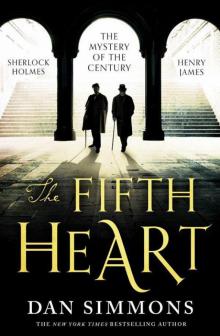 The Fifth Heart
The Fifth Heart Carrion Comfort
Carrion Comfort The Hollow Man
The Hollow Man Summer of Night
Summer of Night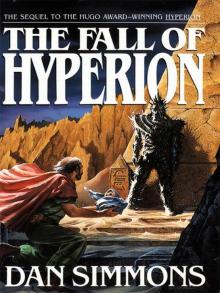 The Fall of Hyperion
The Fall of Hyperion Black Hills
Black Hills A Winter Haunting
A Winter Haunting Hard Freeze
Hard Freeze Prayers to Broken Stones
Prayers to Broken Stones Hard as Nails
Hard as Nails The Guiding Nose of Ulfant Banderoz
The Guiding Nose of Ulfant Banderoz The Rise of Endymion
The Rise of Endymion Orphans of the Helix
Orphans of the Helix Lovedeath
Lovedeath Olympos
Olympos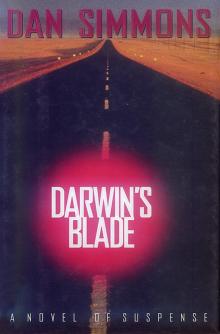 Darwin's Blade
Darwin's Blade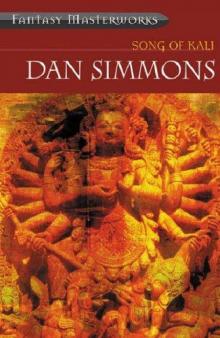 Song of Kali
Song of Kali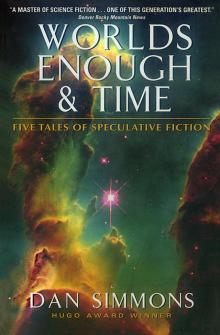 Worlds Enough & Time: Five Tales of Speculative Fiction
Worlds Enough & Time: Five Tales of Speculative Fiction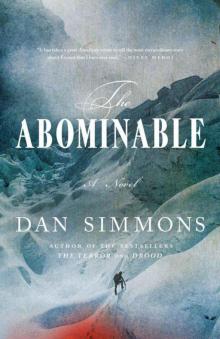 The Abominable
The Abominable The Death of the Centaur
The Death of the Centaur Hard as Nails jk-3
Hard as Nails jk-3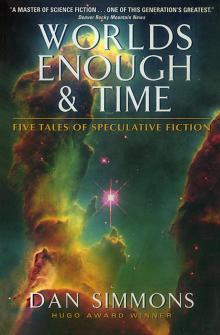 Worlds Enough & Time
Worlds Enough & Time Joe Kurtz Omnibus
Joe Kurtz Omnibus The Hyperion Cantos 4-Book Bundle
The Hyperion Cantos 4-Book Bundle Rise of Endymion
Rise of Endymion Hard Freeze jk-2
Hard Freeze jk-2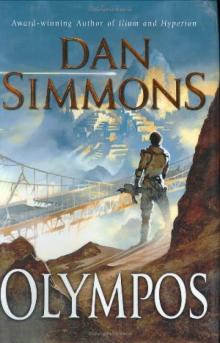 Olympos t-2
Olympos t-2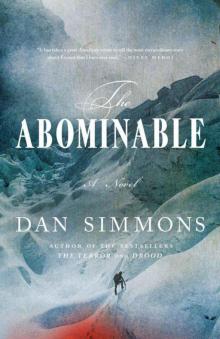 The Abominable: A Novel
The Abominable: A Novel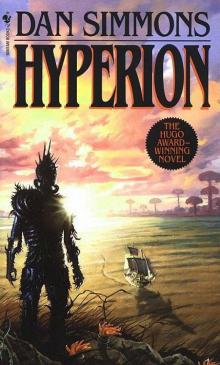 Hyperion h-1
Hyperion h-1 Remembering Siri
Remembering Siri Black Hills: A Novel
Black Hills: A Novel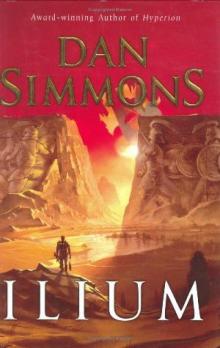 Ilium t-1
Ilium t-1 Hardcase jk-1
Hardcase jk-1 Hyperion 01 - Hyperion
Hyperion 01 - Hyperion